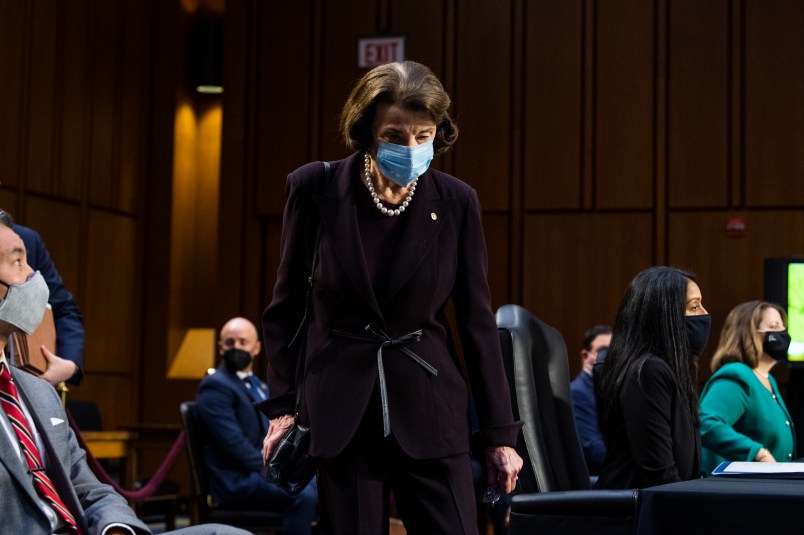In an extremely significant shift, Sen. Dianne Feinstein (D-CA), long one of the more traditional members of the caucus in her support of keeping the filibuster, signaled Tuesday that she would be open to a “carveout” to pass HR1 with a simple majority.
Feinstein “believes that the leadership of the Senate will come up with a path that allows this bill to go forward with 50 Democratic votes,” her state director told progressive group Indivisible, adding that she “will make this the number one bill that has to get through over the next month or two.”
Democrats could potentially change the Senate rules to create an exception to the filibuster when it comes to voting rights legislation, much like Senate Minority Leader Mitch McConnell (R-KY) did with Supreme Court nominees in 2017.
It’s something Rep. Jim Clyburn (D-GA), who has become increasingly strident on the need to reform or kill the filibuster, suggested during a March interview.
“If Manchin and Sinema enjoy being in the majority, they had better figure out a way to get around the filibuster when it comes to voting and civil rights,” he said. “I’m not going to say that you must get rid of the filibuster. I would say you would do well to develop a Manchin-Sinema rule on getting around the filibuster as it relates to race and civil rights.”
Sen. Joe Manchin (D-WV), an avowed disciple of the filibuster who has balked at many suggested reforms, previously expressed disdain for the idea.
“No. No. No. That’s like being a little bit pregnant, maybe,” he said of a carveout, meaning that it’s impossible to partially eliminate the filibuster. It has been partially eliminated multiple times before in just the past 8 years, by McConnell twice and by then-Senate Majority Leader Harry Reid (D-NV) on executive branch nominees and federal judicial appointments.
Still, Feinstein’s movement left could presage a wider caucus shift. She recently expressed a newfound amenability to reforming the filibuster, specifically mentioning President Joe Biden’s embrace of the talking filibuster reform as “an idea worth discussing.”
Sen. Jeff Merkley (D-OR), a longtime leader of the push to eliminate the filibuster, has been advocating a carveout for voting rights legislation since before Democrats even secured an effective majority in the Senate.
“There’s such a sense that protecting and taking on the gerrymandering, voter suppression, and dark money is so important, it could well be a case … where every Democrat would come together to support a simple-majority,” he told The Atlantic last July.
Indeed, desire to expand and protect voting rights, especially amid the nationwide push from Republican legislatures to restrict them after Democratic wins in 2020, has become the primary reason Democrats cite to explain their growing willingness to eliminate or alter the Senate rule.
“All-out opposition to reasonable voting rights protections cannot be enabled by the filibuster; if forced to choose between a Senate rule and democracy itself, I know where I will come down,” wrote Sen. Angus King (I-ME), once much more opposed to touching the rule, in a recent op-ed.
Sen. Raphael Warnock (D-GA), whose state just passed an omnibus bill to inject the GOP legislature into the election process and make it harder to vote, has been doing media circuits to specifically frame up the choice between preserving the filibuster or protecting the sacred right to vote. Warnock is also up for reelection in 2022, a race that would’ve likely been competitive even without this new legislation to dampen Democratic participation.
If Democrats do enact a voting rights carveout when they return from recess, it’ll become a point of fiery contention with Republicans, many of whom are already declaring boycotts of or preparing vindictive legislation for companies who denounce their efforts to suppress votes. Georgia has become the focal point of that fight, after Major League Baseball moved the All-Star Game out of Atlanta to protest Gov. Brian Kemp’s (R) signing of the restrictive voter law.







Get. It. Done.
This is not a significant shift. Feinstein voted for exactly this type of waiver in Nov 2013 when Harry Reid went ‘nuclear’ and changed the 60 vote requirement to 51 for all executive branch and lower court judicial confirmations.
All Dems are suggesting here is to do exactly what Reid did in 2013 and McConnell did in 2017 (for SCOTUS confirmations) and apply it for voting rights. This would actually be more limited than either the Reid or McConnell move because it would apply for just this legislation. The Reid and McConnell adjustments made the rules changes permanent for all future confirmations.
That is a BFD - a very welcome one. We will never make real change without this first real change.
But will she remember tomorrow that she said that today?
Wow, that was rude.
Clyburn:
Clever.